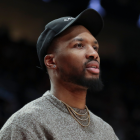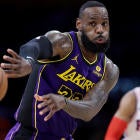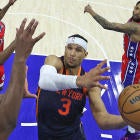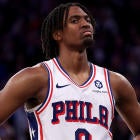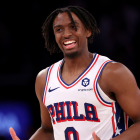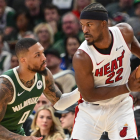
Damian Lillard's eventual move to the Miami Heat seemed inevitable for the majority of the offseason. Agent Aaron Goodwin was so voracious in trying to publicly scare off other suitors that the NBA needed to step in and issue a memo threatening discipline over such messaging. It took months for a market to develop, but the Portland Trail Blazers held firm. Most reports suggested that they hadn't engaged the Heat in trade talks for months.
Eventually, Lillard blinked. According to ESPN's Marc Spears, Goodwin informed the Milwaukee Bucks and Brooklyn Nets roughly 10 days ago that Lillard would be interested in playing for them. The rest is history. Lillard is now a Buck, and the long-term implications for the league even outside of the immediate championship race are staggering.
The player-empowerment movement has followed a largely linear progression since Kobe Bryant was denied his trade request in 2007. It started with stars moving through free agency, led by LeBron James in 2010. Carmelo Anthony pioneered the next stage in 2011, when he forced a trade in the months leading up to his free agency. That next offseason, Chris Paul got his trade a year before he was free to change teams. Dwight Howard did the same in 2012. Slowly, the starting gun moved back.
Anthony Davis made his request 18 months before he was set to become a free agent in 2019. And then Paul George did the same with two years left on his deal that offseason. Kevin Durant had three years left on his deal when he asked for his own move in 2022. It took awhile, but he did eventually make his way to the Phoenix Suns, his preferred destination. Teams would win the occasional staring contest, but the victories were largely pyrrhic. The Knicks got Carmelo Anthony to expand his list from one team (the Rockets) to three (the Thunder and Cavaliers), but did not net a single first-round pick in the deal. The Spurs refused to send Kawhi Leonard to Los Angeles, but the return they got from Toronto was minimal and Leonard just moved west a year later in free agency. When push came to shove, the star generally got what he wanted regardless of how much theoretical leverage his team possessed.
But Lillard was more explicit in his demands than almost any of his peers. His heart was set on a single team and he didn't get there, even conceding defeat by opening the bidding to Milwaukee and Brooklyn. It's possible that this was an isolated incident. After all, despite reports indicating that he might not report to any team besides the Heat, nobody really believed that he would make it ugly to get his way. Lillard has never been the sort of player to seriously consider a holdout. He wouldn't show up to camp intentionally out of shape. There are always greater lengths that a superstar can go to in order to force a specific move. It's also possible that we've found a new line in the sand.
Durant did manage to get his trade to Phoenix, but it's worth noting that he needed to wait half of a season for it to happen. Prior to his January injury, the Nets had just won 18 of their past 20 games. Had Kyrie Irving not forced a trade, Brooklyn likely would have kept both and attempted to compete for the championship. Had they done so, Durant too would have failed to force his desired move with three guaranteed years left on his contract. Had Harden not become available, it's possible that Ben Simmons, with four years left on his own deal during the 2021-22 season, would have been stuck as well.
It's possible that three years is the magic number, an amount of time great enough to ward off the threat of free agency. Most of the time, the player will hold similar trade value with two years left on the deal, so opposing teams can make risky trades under the assumption that they could flip that player down the line. This, to some extent, is what is going on in Cleveland right now. The Cavaliers landed Donovan Mitchell with three years left on his contract last summer. He's now down to two, and rumors about a desired move to New York have been brewing all offseason. If this season goes well, perhaps Mitchell extends. If it doesn't? Cleveland can recoup some meaningful portion of its investment by trading Mitchell again.
But the symbolic nature of this victory could prove even more powerful. If player empowerment has indeed found a limit, what's to stop teams from pushing back? After all, the threat of free agency doesn't loom quite as large as it once did. No reigning All-NBA player has changed teams through free agency since the 2019 offseason. That's no accident, as competitive teams rarely generate max cap space anymore. The only team to sign an external player to a max contract this offseason was the Houston Rockets, who were the worst team in the NBA in two of the past three seasons. Might some particularly bold front office dare its star to test free agency in a world in which only lottery teams tend to have space?
The Philadelphia 76ers tried a version of that this offseason. James Harden had a player option on his contract. They refused to offer him a long-term contract, and once the threat of a Rockets offer dried up, there simply wasn't another viable destination for Harden. The few teams that had cap space were some combination of uncompetitive and uninterested, and none played in marquee markets. So Harden had little choice but to opt-in and hope the 76ers would trade him to his preferred Clippers. Thus far, they haven't yielded.
There is no homeostasis in the NBA. As soon as a possible trend emerges, some team breaks it by defying convention. One could even argue the 76ers are trying to do so by prioritizing cap space next offseason. If no other winning team is going to do so, it essentially grants them a monopoly over free agency. For all we know, the next superstar with three years left on his deal to want a trade might have some novel strategy to actually get to his preferred team. The rules of the game are changing constantly.
But this is still arguably the biggest team win of the player-empowerment era. The Heat spent months low-balling the Blazers in part because history said Lillard would get his way. He didn't, and while it's too early to say what exactly that will mean for the future of player empowerment, it's hard to look at it as anything other than a major victory for teams league-wide.













